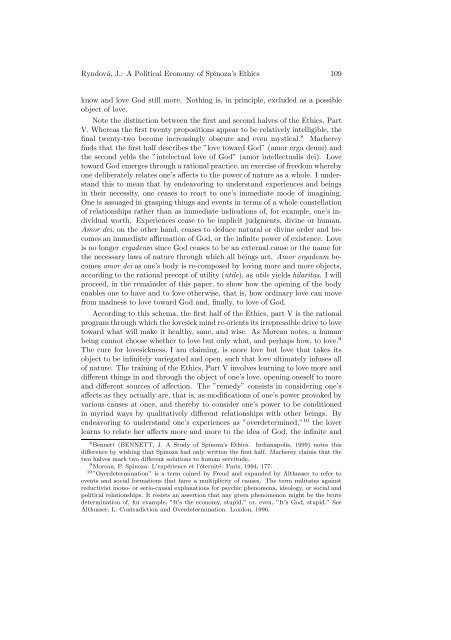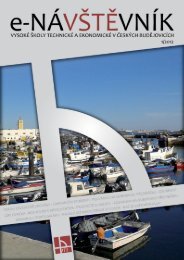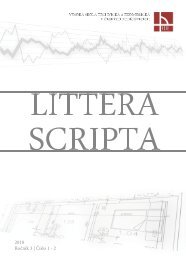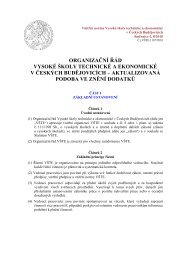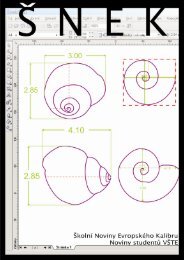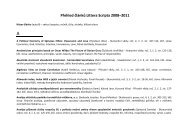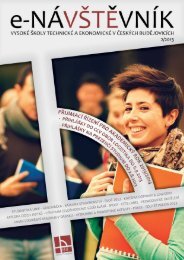108 Littera Scripta, 2009, roč. 2, č. 2ways, is useful to man; the more it renders the body capable of being affectedin a great many ways, or affecting other bodies, the more useful it is; on theother hand, what renders the body less capable of these things is harmful. 1Crazy love closes most of the body and the mind off from most of the world,and, in this way, injures the individual. The concept of utility operates asa selective criterion determining reason to seek openness - passive as much asactive - to the world. The effort to know demands that one endeavor to multiplycorporeal sites susceptible to affection, as Spinoza establishes in the Ethics, PartII. 2 In addition, the greatest peace of mind (acquiescentia in se ipso) emergesfrom considering one’s actions in the world, one’s ability to relate to and affectothers (the Ethics, Part IV). 3HilaritasIn the Ethics, Spinoza defines ”cheerfulness” (hilaritas) as precisely the kind ofjoy that comes from an openness of the entire body to being affected by othernatural beings: ”Cheerfulness (see its definition in the Ethics, Part III) 4 is a joywhich, insofar as it is related to the body, consists in this, that all parts of thebody are equally affected”. 5 Because the human body is a complex individualwith many different kinds of things and love in as many ways as possible (seethe Ethics, Part 4). 6 Following the rule of utility, through which one aims tobe affected and to affect others as much possible, is the rational path leadingtoward intuition; utile reveals how ”striving, or desire, to know things by thethird kind of knowledge can indeed arise from the second”. 7Cheerfulness, or hilaritas, does not generally occur spontaneously. Naturally,humans, prompted by imagination, fixate upon a single (albeit complex) sourceof joy, identify a single love object, and thereby fall prey to various sicknessesof the mind and follies of fortune. If one can engage, however, ina practice bywhich the lovesick mind opens itself to ever more objects of pleasure and joyand amplifies as many parts of its body as possible, it will find itself on the pathtoward the intelectual love of God.Mad love is exclusive: it is a love that touches especially one part of thebody, is available only to one person, closes that person off from most of herfellow human beings, and, in the worst cases, destroys her singular proportionof motion and rest, changing her essence so as to bring about her death. Lovetoward God, on the other hand, delivers eternal joy because it affects every partof the body at once. It is an inclusive love that opens the body to relate all ofits affections to God. There is no part of nature that cannot enjoin the body to1 Spinoza,B. Ethics. Indianapolis, 1992, 1762 Spinoza,B. Ethics. Indianapolis, 1992, 763 Spinoza,B. Ethics. Indianapolis, 1992, 1834 Spinoza,B. Ethics. Indianapolis, 1992, 1105 Spinoza,B. Ethics. Indianapolis, 1992, 110-1116 Spinoza,B. Ethics. Indianapolis, 1992, 1797 Spinoza,B. Ethics. Indianapolis, 1992, 215
Ryndová, J.: A Political Economy of Spinoza’s Ethics 109know and love God still more. Nothing is, in principle, excluded as a possibleobject of love.Note the distinction between the first and second halves of the Ethics, PartV. Whereas the first twenty propositions appear to be relatively intelligible, thefinal twenty-two become increasingly obscure and even mystical. 8 Machereyfinds that the first half describes the ”love toward God” (amor erga deum) andthe second yelds the ”intelectual love of God” (amor intellectualis dei). Lovetoward God emerges through a rational practice, an exercise of freedom wherebyone deliberately relates one’s affects to the power of nature as a whole. I understandthis to mean that by endeavoring to understand experiences and beingsin their necessity, one ceases to react to one’s immediate mode of imagining.One is assuaged in grasping things and events in terms of a whole constellationof relationships rather than as immediate indications of, for example, one’s individualworth. Experiences cease to be implicit judgments, divine or human.Amor dei, on the other hand, ceases to deduce natural or divine order and becomesan immediate affirmation of God, or the infinite power of existence. Loveis no longer ergadeum since God ceases to be an external cause or the name forthe necessary laws of nature through which all beings act. Amor ergadeum becomesamor dei as one’s body is re-composed by loving more and more objects,according to the rational precept of utility (utile), as utile yields hilaritas. I willproceed, in the remainder of this paper, to show how the opening of the bodyenables one to have and to love otherwise, that is, how ordinary love can movefrom madness to love toward God and, finally, to love of God.According to this schema, the first half of the Ethics, part V is the rationalprogram through which the lovesick mind re-orients its irrepressible drive to lovetoward what will make it healthy, sane, and wise. As Moreau notes, a humanbeing cannot choose whether to love but only what, and perhaps how, to love. 9The cure for lovesickness, I am claiming, is more love but love that takes itsobject to be infinitely variegated and open, such that love ultimately infuses allof nature. The training of the Ethics, Part V involves learning to love more anddifferent things in and through the object of one’s love, opening oneself to moreand different sources of affection. The ”remedy” consists in considering one’saffects as they actually are, that is, as modifications of one’s power provoked byvarious causes at once, and thereby to consider one’s power to be conditionedin myriad ways by qualitatively different relationships with other beings. Byendeavoring to understand one’s experiences as ”overdetermined,” 10 the loverlearns to relate her affects more and more to the idea of God, the infinite and8 Bennett (BENNETT, J. A Study of Spinoza’s Ethics. Indianapolis, 1999) notes thisdifference by wishing that Spinoza had only written the first half. Macherey claims that thetwo halves mark two different solutions to human servitude.9 Moreau, P. Spinoza: L’expérience et l’éternité. Paris, 1994, 177.10 ”Overdetermination” is a term coined by Freud and expanded by Althusser to refer toevents and social formations that have a multiplicity of causes. The term militates againstreductivist mono- or serio-causal explanations for psychic phenomena, ideology, or social andpolitical relationships. It resists an assertion that any given phenomenon might be the brutedetermination of, for example, ”It’s the economy, stupid,” or, even, ”It’s God, stupid.” SeeAlthusser, L. Contradiction and Overdetermination. London, 1996.
- Page 3 and 4:
OBSAHEkonomikaamanagement7 Kabourko
- Page 5:
ÚvodníslovoVáženékolegyně,vá
- Page 8:
8 LitteraScripta,2009,roč.2,č.2V
- Page 11:
Kabourková,K.,Walterová,D.,Marš
- Page 14 and 15:
14 LitteraScripta,2009,roč.2,č.22
- Page 16 and 17:
16 LitteraScripta,2009,roč.2,č.2P
- Page 18 and 19:
18 LitteraScripta,2009,roč.2,č.2p
- Page 20 and 21:
20 LitteraScripta,2009,roč.2,č.2o
- Page 23 and 24:
Kalkulacenákladůajejívýznamprot
- Page 25 and 26:
Šolc,L.,Švejdová,G.,Jambal,T.:Ka
- Page 27 and 28:
Šolc,L.,Švejdová,G.,Jambal,T.:Ka
- Page 29 and 30:
Šolc,L.,Švejdová,G.,Jambal,T.:Ka
- Page 31 and 32:
Šolc,L.,Švejdová,G.,Jambal,T.:Ka
- Page 33 and 34:
Šolc,L.,Švejdová,G.,Jambal,T.:Ka
- Page 35 and 36:
Oceňovánípracovníchmístahodnoc
- Page 37 and 38:
Švejdová,G.,Jambal,T.,Šolc,L.:Oc
- Page 39 and 40:
Švejdová,G.,Jambal,T.,Šolc,L.:Oc
- Page 41 and 42:
Švejdová,G.,Jambal,T.,Šolc,L.:Oc
- Page 43 and 44:
Rating of the national corporationB
- Page 45 and 46:
Vochozka, M., Mulač, P.: Rating of
- Page 47 and 48:
Vochozka, M., Mulač, P.: Rating of
- Page 49 and 50:
Vochozka, M., Mulač, P.: Rating of
- Page 51 and 52:
Vochozka, M., Mulač, P.: Rating of
- Page 53 and 54:
Vochozka, M., Mulač, P.: Rating of
- Page 55 and 56:
Vochozka, M., Mulač, P.: Rating of
- Page 57: Vochozka, M., Mulač, P.: Rating of
- Page 60 and 61: 60 Littera Scripta, 2009, roč. 2,
- Page 62 and 63: 62 Littera Scripta, 2009, roč. 2,
- Page 64 and 65: 64 Littera Scripta, 2009, roč. 2,
- Page 66 and 67: 66 Littera Scripta, 2009, roč. 2,
- Page 69 and 70: Practice and Theory of the Corporat
- Page 71 and 72: Bendová, Š., Walterová, D.: Prac
- Page 73 and 74: Bendová, Š., Walterová, D.: Prac
- Page 75 and 76: Bendová, Š., Walterová, D.: Prac
- Page 77: Bendová, Š., Walterová, D.: Prac
- Page 80 and 81: 80 LitteraScripta,2009,roč.2,č.2
- Page 82 and 83: 82 LitteraScripta,2009,roč.2,č.2
- Page 84 and 85: 84 LitteraScripta,2009,roč.2,č.2h
- Page 86 and 87: 86 LitteraScripta,2009,roč.2,č.2
- Page 88 and 89: 88 LitteraScripta,2009,roč.2,č.2O
- Page 90 and 91: 90 LitteraScripta,2009,roč.2,č.2[
- Page 93 and 94: DerFremdsprachenunterrichtindertert
- Page 95 and 96: Hrušková,L.:DerFremdsprachenunter
- Page 97 and 98: Hrušková,L.:DerFremdsprachenunter
- Page 99 and 100: Hrušková,L.:DerFremdsprachenunter
- Page 101 and 102: Hrušková,L.:DerFremdsprachenunter
- Page 103 and 104: Hrušková,L.:DerFremdsprachenunter
- Page 105: Hrušková,L.:DerFremdsprachenunter
- Page 110 and 111: 110 Littera Scripta, 2009, roč. 2,
- Page 112 and 113: 112 Littera Scripta, 2009, roč. 2,
- Page 114 and 115: 114 Littera Scripta, 2009, roč. 2,
- Page 116 and 117: 116 LitteraScripta,2009,roč.2,č.2
- Page 118 and 119: 118 LitteraScripta,2009,roč.2,č.2
- Page 120 and 121: 120 LitteraScripta,2009,roč.2,č.2
- Page 122 and 123: 122 LitteraScripta,2009,roč.2,č.2
- Page 124 and 125: 124 Littera Scripta, 2009, roč. 2,
- Page 126 and 127: 126 Littera Scripta, 2009, roč. 2,
- Page 128 and 129: 128 LitteraScripta,2009,roč.2,č.2
- Page 130 and 131: 130 LitteraScripta,2009,roč.2,č.2
- Page 132 and 133: 132 LitteraScripta,2009,roč.2,č.2
- Page 134 and 135: 134 LitteraScripta,2009,roč.2,č.2
- Page 137 and 138: Analytickézákladypravděpodobnost
- Page 139 and 140: Dedecius,K.,Kalová,J.,Kurcová,V.:
- Page 141 and 142: Dedecius,K.,Kalová,J.,Kurcová,V.:
- Page 143 and 144: LineárníexpanzeideálníhoplynuJa
- Page 145 and 146: Kalová,J.,Mareš,R.:Lineárníexpa
- Page 147 and 148: Kalová,J.,Mareš,R.:Lineárníexpa
- Page 149 and 150: Kalová,J.,Mareš,R.:Lineárníexpa
- Page 151: Kalová,J.,Mareš,R.:Lineárníexpa
- Page 154 and 155: 154 LitteraScripta,2009,roč.2,č.2
- Page 156 and 157: 156 LitteraScripta,2009,roč.2,č.2
- Page 158 and 159:
158 LitteraScripta,2009,roč.2,č.2
- Page 161 and 162:
Typology and landscapestructuraliza
- Page 163 and 164:
Váchal, J.: Typology and landscape
- Page 165 and 166:
Váchal, J.: Typology and landscape
- Page 167 and 168:
Váchal, J.: Typology and landscape
- Page 169 and 170:
Váchal, J.: Typology and landscape
- Page 171 and 172:
Váchal, J.: Typology and landscape
- Page 173 and 174:
Váchal, J.: Typology and landscape
- Page 175 and 176:
Váchal, J.: Typology and landscape
- Page 177:
Váchal, J.: Typology and landscape
- Page 180 and 181:
180 LitteraScripta,2009,roč.2,č.2
- Page 182 and 183:
182 LitteraScripta,2009,roč.2,č.2
- Page 184 and 185:
184 LitteraScripta,2009,roč.2,č.2
- Page 186 and 187:
186 LitteraScripta,2009,roč.2,č.2
- Page 188 and 189:
188 LitteraScripta,2009,roč.2,č.2
- Page 190 and 191:
190 LitteraScripta,2009,roč.2,č.2
- Page 192 and 193:
192 LitteraScripta,2009,roč.2,č.2
- Page 195 and 196:
Provázanoststavebníhozákonaaněk
- Page 197 and 198:
Konečný,F.:Provázanoststavebníh
- Page 199 and 200:
Konečný,F.:Provázanoststavebníh
- Page 201 and 202:
Nepřípustnávýstavbaindividuáln
- Page 203 and 204:
Kupilík,V.,Bednářová,P.:Nepří
- Page 205 and 206:
Kupilík,V.,Bednářová,P.:Nepří
- Page 207 and 208:
Kupilík,V.,Bednářová,P.:Nepří
- Page 209 and 210:
Kupilík,V.,Bednářová,P.:Nepří
- Page 211 and 212:
Kupilík,V.,Bednářová,P.:Nepří
- Page 213 and 214:
Kupilík,V.,Bednářová,P.:Nepří
- Page 215 and 216:
5 6789: ;?@;A BCDEFGHDIDJCC.ù úû
- Page 217 and 218:
aeruginosa - ÓÔÕÖ×ÖØÙÚÛÜ
- Page 219 and 220:
A. BCDEF4. §¨© ¡¢£¤¥¦Š‹
- Page 221 and 222:
Nikiforov,V.V.:Perspektivyispol’z


